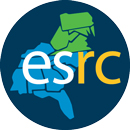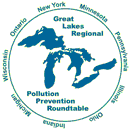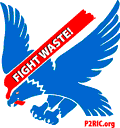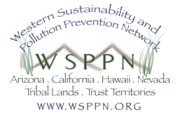P2 Resource Exchange
Search P2RX
Searching the P2Rx Database will take you away from the US EPA site. Please click on this link for more information: ![]()
Links Outside EPA
This page provides links to non-EPA web sites. For information on leaving the EPA.gov domain and visiting other sites: ![]()
The Pollution Prevention Resource Exchange (P2Rx™) is a national partnership of regional pollution prevention information centers funded in part through grants from EPA. Their mission is to advance pollution prevention as a cornerstone of sustainability. They build networks, deliver P2 information, and measure P2 program results. The strength of the network lies in the expertise and diversity among the regional centers and the variety of audiences served including States, local governments, technical assistance providers, businesses, educators, and nonprofit organizations.
About P2Rx Information Centers
P2Rx National Coordinator:
Beth Anderson
US EPA Headquarters
1200 Pennsylvania Ave., NW - MC 7409M
Washington, DC 20460
Phone: 202-564-8833
Fax: 202-564-8899
E-mail: anderson.beth@epa.gov
The goals of the P2Rx Information Centers are to:
- Build and facilitate dynamic regional and national P2 topic driven networks.
- Serve as the trusted source for P2 information.
- Increase the awareness, accessibility, and usability of P2 information.
- Evaluate and measure the impact of various tools to achieve our goals.
P2 Information
Topic Hubs
Topic Hubs are web-based guides to peer-reviewed pollution prevention information and expertise on a particular subject.
SUSTAIN Updates
This project provides an accessible workspace on the P2Rx wiki for contributors to identify and improve best practices information about issues as they emerge.
Sector Resources
Technical documents organized by industry sector available from four P2Rx Centers.
P2TagTeam
The P2TagTeam is an effort of pollution prevention (P2) professionals to share their resources – namely the "bookmarks" they find that they want to use again and want to share with the P2 Community.
Tribal P2
The National Pollution Prevention Roundtable (NPPR) Tribal Workgroup consists of environmental professionals from tribal entities, local, state and federal agencies, academia, and not-for-profit organizations whose mission is to work collaboratively with tribes throughout the United States in reducing the environmental and health risks associated with the generation of waste in tribal lands.
P2 Case Studies
A list of links to case studies found on a variety of sites.
Rapid Response
P2Rx Centers offer rapid, individual assistance by providing answers to specific questions or gathering resources on a topic.
National P2 News
P2 news services.P2Rx centers distribute news articles and other timely P2 information. Centers either post news headlines and abstracts, or distribute them via periodic e-mail, or both.
P2 Webinars
Webinars sponsored by P2Rx regional centers are designed to share best practices and the latest information and news across the broadest possible audience without the participants needing to leave the convenience of their offices.
Networking
Listservs
Centers maintain national and regional topical listserves and archives. P2 technical assistance providers can participate in discussions or research questions via the archive.
Measurement
P2 Results Data System
P2Rx centers all offer regional modules to record pollution prevention activity and outcome measures. The goal is to provide an efficient and effective way for analyzing and presenting results of P2 efforts for regions and the entire country.
P2Rx Regional Information Centers in EPA Regions
Region 1, 2
Northeast Waste Management Officials' Association (NEWMOA)
CT, MA, ME, NH, NJ, NY, RI, VT
129 Portland St., Suite 602
Boston, MA 02114-2014
617-367-8558 #306
617-367-0449 (FAX)
Contact: abray@newmoa.org
NEWMOA is an interstate association that has a membership composed of the hazardous waste, solid waste, waste site cleanup, and pollution prevention programs in the Northeast states. NEWMOA's mission is to develop and sustain an effective partnership of states that helps achieve a clean, healthy, and sustainable environment by exploring, developing, promoting, and implementing environmentally sound solutions for:
- Reducing materials use and preventing pollution and waste,
- Properly reusing and recycling discarded materials that have value,
- Safely managing solid and hazardous wastes, and
- Remediating contaminated sites.
NEWMOA's P2 workgroups and networking groups are funded by Source Reduction Assistance grants from EPA Regions 1 & 2. NEWMOA often leverages these workgroups for their expertise in planning and developing P2Rx products and resources. NEWMOA's current workgroups and networking groups include:
- Auto Recycling Networking Group
- Hospitality Workgroup
- Garment Cleaning Workgroup
- Marinas Workgroup
- Northeast States Assistance & Pollution Prevention Roundtable Steering Committee
- Pollution Prevention & Compliance Assistance Metrics Networking Group
Region 3, 4
Environmental Sustainability Resource Center (ESRC)
AL, DC, DE, FL, GA, KY, MD, MS, NC, PA, SC, TN, VA, WV
Kentucky Pollution Prevention Center
University of Louisville
Louisville, Kentucky 40292
502-852-0965
502-852-0964 (FAX)
Contact: info@esrconline.org
The Environmental Sustainability Resource Center (ESRC) provides pollution prevention technical support to the states in EPA Regions 3 and 4. ESRC is a member of the P2Rx network of regional centers.
Region 5
Great Lakes Regional Pollution Prevention Roundtable (GLRPPR)
IL, IN, MI, MN, NY, OH, PA, WI, Ontario, Canada
Illinois Sustainable Technology Center
One E. Hazelwood Dr.
Champaign, IL 61820
217-333-8946
217-333-8944 (FAX)
Contact: glrppr@istc.illinois.edu
The Great Lakes Regional Pollution Prevention Roundtable (GLRPPR) is a professional organization dedicated to promoting information exchange and providing networking opportunities. GLRPPR's membership consists of assistance providers, business, industry, governmental agencies, NGO's, non-profits, consultants, vendors, universities, etc. from Wisconsin, Minnesota, Illinois, Indiana, Ohio, Michigan, Pennsylvania, New York and Ontario. GLRPPR also has members that are located outside of the Great Lakes region, but have similar environmental priorities and concerns.
Region 6
Zero Waste Network
AR, LA, NM, OK, TX
University of Texas Arlington
Center for Environmental Excellence
9390 Research Blvd, Suite 300
Austin, Texas 78759
512-904-2281
512-904-2288 (FAX)
Contact: admin@zerowastenetwork.org
The Zero Waste Network is a group of environmental professionals dedicated to finding money-saving options for conserving our natural resources. It is a collaborative project of the U.S. EPA, the University of Texas, and regional environmental agencies - that works to identify pollution prevention options for large and small businesses as well as consumers. The Network hosts databases with over 500 success stories, a material exchange service, and over 1000 BMP's supplied by industry and partners. The Network trains nearly 300 environmental professionals from industry, local government and other entities to prevent pollution at its source with EMS's, Lean and Green Processing and process mapping.
Workgroups:
- PPRC and the Zero Waste Network co-facilitate the NPPR Lean and Environment Workgroup that meets monthly to assist lean and green practitioners and manufacturing businesses to share best practices.
Region 7
Pollution Prevention Regional Information Center (P2RIC)
IA, KS, MO, NE
University of Nebraska at Omaha
6001 Dodge St., RH 308
Omaha, NE 68182
402-554-6257
402-554-6260 (FAX)
Contact: contact@p2ric.org
Pollution Prevention Regional Information Center (P2RIC) strives to improve resource sharing between the programs, businesses, and agencies of EPA Region 7 (Iowa, Kansas, Missouri, Nebraska) that provide waste reduction services and expertise to business and industry. Housed in the first LEED certified building in the University of Nebraska system at the College of Business Administration, P2RIC emphasizes partnerships to promote sound business strategies for a sustainable future.
Region 8
Peaks to Prairies Pollution Prevention Information Center
CO, MT, ND, SD, UT, WY
Montana State University Extension Service
PO Box 173580
Bozeman, MT 59717
406-994-3451
406-994-5417 (FAX)
Contact: information@peakstoprairies.org
In cooperation with EPA Region 8 states, Peaks to Prairies encourages adoption of pollution prevention practices by citizens, small businesses, and local governments. The Center offers access to current information and contacts, encourages collaboration and leveraging of resources between programs, and builds information systems to enhance information dissemination.
Region 9
Western Sustainability and Pollution Prevention Network (WSPPN)AZ, CA, HI, NV
6100 Neil Rd., Suite 400
Reno, NV 89511
775-689-6678
775-689-6689 (FAX)
Contact: dwalden@unr.edu
The Western Sustainability and Pollution Prevention Network (WSPPN) is a strategic alliance involving local, state, federal and tribal pollution prevention (P2) programs throughout EPA Region 9, which includes the states of California, Nevada, Arizona, Hawaii, the Tribal Lands and the Trust Territories of Guam and American Samoa. WSPPN has documented service delivery to over 175 programs through its annual conference and to 580 organizations through its webinar service. WSPPN is administered by the Business Environmental Program at the University of Nevada, Reno College of Business affiliated with the Nevada Small Business Development Center (NSBDC) and is uniquely positioned to lead WSPPN as a statewide technical assistance provider of advisory services for environmental compliance, pollution prevention, sustainability, energy efficiency, renewable energy, and clean technology development.
Workgroups:
The West Coast Environmentally Preferable Purchasing Collaborative is a collective of state government personnel interested in sharing knowledge and expertise related to environmentally preferable purchasing practices. (co-managed by WSPPN and PPRC).
In Nevada, WSPPN is responsible for organizing and coordinating working group meetings of convention and hotel/casino properties in Reno and Las Vegas to identify and share information and incorporate practices and technologies to improve the sustainability of their operations.
Region 10
Pacific Northwest Pollution Prevention Resource Center (PPRC)
WA, ID, OR, AK
1402 Third Ave. Suite 1420
Seattle, WA 98101
206-352-2050
206-352-2049 (FAX)
Contact: office@pprc.org
PPRC is the leading regional (Washington, Oregon, Alaska, and Idaho) non-profit that provides practical, on-the-ground technical assistance to businesses, public agencies, and non-profits that are seeking to conserve resources and improve economic performance. PPRC believes that environmental and economic vitality go hand in hand, and that both are necessary to protect the high quality of life enjoyed in our region. PPRC’s focuses are helping to reduce toxic pollutants in the environment and improve energy efficiency in regional businesses and manufacturers.
Workgroups:
The West Coast Environmentally Preferable Purchasing Collaborative is a collective of state government personnel interested in sharing knowledge and expertise related to environmentally preferable purchasing practices. (co-managed by PPRC and WSPPN).
PPRC and the Zero Waste Network co-facilitate the NPPR Lean and Environment Workgroup that meets monthly to assist lean and green practitioners and manufacturing businesses to share best practices.
![[logo] US EPA](https://cybercemetery.unt.edu/archive/oilspill/20120925123445im_/http://www.epa.gov/epafiles/images/logo_epaseal.gif)







